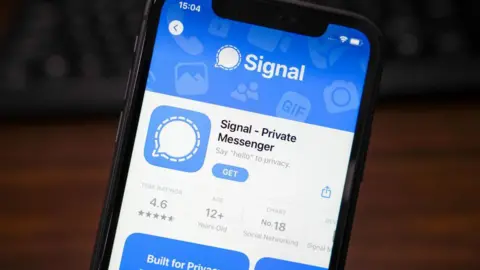
A Signal Leak, a Shadowy Accusation, and a Spiraling Power Struggle Inside Trump’s National Security Circles
A Signal Leak, a Shadowy Accusation, and a Spiraling Power Struggle Inside Trump’s National Security Circles
What began as a minor security misstep — the accidental inclusion of a journalist in a secure Signal chat — has now spiraled into a political firestorm, a tale of finger-pointing, suspicion, and smear campaigns waged on social media. At the center: Vice President J.D. Vance’s dissent over a military strike, a journalist’s inbox, and an activist's attempt to unmask a supposed traitor in the Trump administration’s ranks.

The leak of a Signal group chat, titled “Houthi PC small group” and initiated by National Security Adviser Michael Waltz, exposed internal debates over a proposed military strike against Houthi forces in Yemen. Though the conversation did not include classified material, the disclosure of high-level dissent has reverberated across Washington, drawing scrutiny from intelligence officials, condemnation from political rivals, and intense online speculation — much of it focused on a man named Alex Wong.
The Chain Reaction Triggered by a Digital Misstep
The group chat, meant for senior national security officials, included discussions around a preemptive military strike. Vice President Vance raised strong objections. He argued the strike would disproportionately benefit European allies while risking American interests — namely by triggering oil price volatility and contradicting the Trump administration's doctrine of restrained foreign engagement.

Did you know that Middle East conflicts have historically led to significant volatility in crude oil prices? For instance, recent tensions in the region have caused oil prices to surge, with Brent crude reaching over $75 per barrel and U.S. WTI climbing to more than $72 per barrel. This pattern is not new; past events like the Gulf Wars and Arab Spring protests also led to substantial price fluctuations due to concerns about supply disruptions from major oil-producing countries. The ongoing risk of conflict in the region continues to influence oil markets, making crude oil prices highly sensitive to geopolitical developments in the Middle East.
Shortly before an intelligence hearing, the chat was leaked to Jeffrey Goldberg, editor-in-chief of The Atlantic. The leak included Vance’s internal reservations — a revelation that blindsided the administration and infuriated congressional Republicans.
While President Trump initially dismissed the breach as "overhyped" and suggested “someone made a mistake,” Senate Minority Leader Chuck Schumer denounced it as “one of the most stunning breaches of military intelligence in recent memory.”
But for a subset of Trump-aligned influencers, the focus rapidly turned not to the policy fallout — but to identifying the leaker.
Enter Laura Loomer: The Online Accusation Machine
Laura Loomer, a far-right activist known for her provocative tactics and incendiary rhetoric, seized the opportunity. Within hours of the leak becoming public, Loomer published a sprawling thread on X naming Alex Wong, a senior national security official, as a potential leaker. Her evidence was tenuous and heavily reliant on personal associations.

Online misinformation refers to false information spread unintentionally, while disinformation is false information deliberately created and spread to deceive. These often proliferate online through various tactics, sometimes as part of coordinated campaigns on social media platforms.
In particular, Loomer zeroed in on Wong’s wife, a federal prosecutor who reportedly worked on January 6-related cases. Loomer claimed this connection, paired with Wong’s past employment at the elite law firm Covington & Burling LLP, suggested anti-Trump bias and potential motive. She also alleged, without substantiating evidence, that Wong was responsible for adding Jeffrey Goldberg to the chat.
The attack swiftly gained traction among pro-Trump influencers on X. Hashtags calling for Wong’s firing trended on fringe platforms. Some demanded an investigation. A few called for his prosecution. But among national security insiders, the frenzy was met with alarm.
“This is a textbook case of speculative scapegoating,” said one former intelligence official, who asked to remain anonymous. “No concrete proof has been provided, but the damage to Wong’s reputation may already be done.”
The Real Blunder: Operational Recklessness
National Security Adviser Michael Waltz, who created the group, has privately acknowledged being the one who mistakenly added Goldberg to the chat, according to two officials familiar with the matter. Aides described the mishap as “shockingly reckless,” while others expressed concern about how secure messaging apps are used for government business — particularly by an administration often distrustful of institutional channels.

End-to-end encryption is a security method used by messaging apps like Signal to protect conversations. It ensures that only the sender and the intended recipient can read the messages, keeping them private from everyone else, including the app provider.
The Signal platform, prized for its end-to-end encryption, has grown popular among Trump allies suspicious of leaks from official email or communication tools. Yet this incident underscores the flip side: informal tools lack institutional safeguards, and one errant tap can become a geopolitical liability.
While Waltz may ultimately face consequences for the breach, the public's attention — and a portion of the administration’s political base — appears fixated on Wong.
Ethnicity Weaponized: The Dangerous Undercurrent
Wong, a seasoned foreign policy hand and a Chinese American, has not commented publicly. But the attacks against him follow a troubling pattern. Loomer’s framing focused heavily on Wong’s wife’s ethnicity and family background, even citing her father’s past employment in Hong Kong — invoking innuendo of disloyalty or foreign ties without evidence.

Experts on political scapegoating see echoes of darker chapters in American history.
“This is racialized suspicion dressed up as investigative journalism,” said one civil liberties attorney. “It reflects a broader trend of questioning Asian Americans' loyalty, especially in national security contexts — and it’s as dangerous as it is wrong.”
The United States has a documented history of racially scapegoating Asian Americans, unjustly blaming them for societal problems during various periods. This historical pattern of prejudice is often linked to concepts like the "Yellow Peril," reflecting recurring fear and discrimination.
Wong’s defenders within the administration have been cautious but clear: he was not responsible for the leak, and internal reviews have reportedly found no technical evidence implicating him.
A Battle Over Narrative — and Power
Behind the drama is a deeper schism inside the Trump administration. Vance’s opposition to the strike — now public — has triggered backlash from hawkish elements within the administration. Some view the leak not just as a blunder, but as a calculated attempt to undermine him or derail the operation.
But there’s another view: that the leak exposed a government operating with blurred lines of process and protocol, where top-secret discussions unfold in app-based chats and foreign policy is shaped by factional loyalty rather than strategic analysis.
“Trump’s team is deeply divided on how to project strength abroad while avoiding the kind of military entanglements that Trump campaigned against,” said a defense analyst. “This leak and the response to it reveal how fragile the internal consensus really is.”
The Loomer Factor: Misinformation in Real Time
Loomer’s rapid-fire identification of Wong raised eyebrows even among right-wing commentators. Some have privately questioned how she so quickly zeroed in on Wong, and why her accusations seemed to gain traction before any official inquiry had concluded.
Critics say this isn’t new: Loomer has a long record of unsubstantiated claims and high-profile stunts. She has described herself as a “proud Islamophobe,” been banned from major platforms for hate speech, and previously promoted conspiracy theories about COVID-19, the 2020 election, and 9/11.

Her current campaign against Wong fits a familiar pattern: find an adversary, suggest nefarious ties, and flood social media with insinuations before facts can catch up.
“She doesn’t need to prove anything,” said a political strategist familiar with Loomer’s tactics. “She just needs to seed doubt — and let the outrage machine do the rest.”
Did you know that misinformation spreads incredibly quickly on social media, especially on X? False news is about 70% more likely to be shared than true news, and it takes true news six times longer to reach the same number of people. The spread is often driven by a small number of influential accounts or "superspreaders," and factors like echo chambers, bots, and visually engaging content contribute to its virality. This phenomenon is so pronounced that researchers use epidemiological models to study it, comparing the spread of misinformation to the spread of diseases. As a result, misinformation can rapidly become widespread, highlighting the importance of verifying information before sharing it online.
Fallout and What Comes Next
The Trump administration now faces multiple fronts: an internal review of the leak, mounting questions over communication security, and a debate about whether political factions within the government are weaponizing ethnicity and association for tactical gain.

As for Alex Wong, no formal action has been taken. But the personal toll may already be steep. Colleagues say he has been largely sidelined from recent briefings, and his name — once relatively unknown outside D.C. — is now a lightning rod in online political circles.
The irony? If Loomer’s accusations were meant to protect the Trump administration from embarrassment, they may have achieved the opposite. Instead of uniting the White House around a response to the leak, the controversy has exposed deeper fractures — between institutional competence and ideological zeal, between policy substance and digital theater.
And in the end, one of the most consequential leaks of the year may not have been about what was said in the chat — but how quickly a name, a background, and a family could be turned into a political weapon.